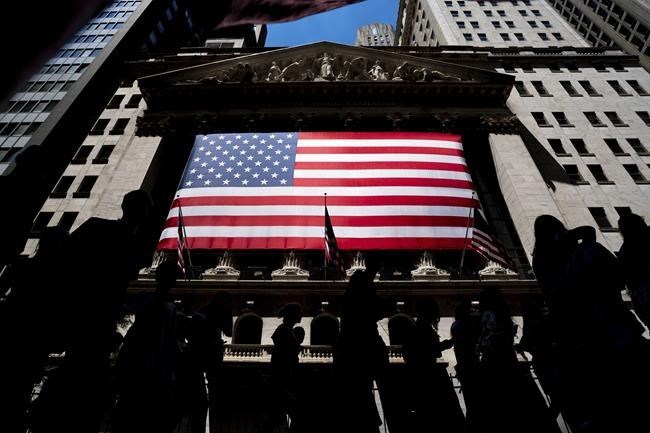NEW YORK (AP) — Stocks closed higher on Wall Street after the head of the Federal Reserve signaled last week’s stunningly strong jobs report isn’t likely to change where interest rates are heading on its own, as some investors had feared. The S&P 500 rose 1.3% Tuesday. The Nasdaq added 1.9% and the Dow rose 0.8%. Comments from Fed chief Jerome Powell sent stocks from losses to big gains and then back and forth a couple times. High inflation and how high the Fed will take interest rates to fight it have been at the center of Wall Street’s wild movements for more than a year.
THIS IS A BREAKING NEWS UPDATE. AP’s earlier story follows below.
NEW YORK (AP) — Wall Street is ticking higher Tuesday after the head of the Federal Reserve signaled last week’s stunningly strong jobs report isn’t likely to change where interest rates are heading on its own, as some investors had feared.
The S&P 500 was 0.8% higher in afternoon trading after comments from Fed Chair Jerome Powell sent stocks pinging between losses and gains a couple times. The Dow Jones Industrial Average was up 129 points, or 0.4%, at 34,020, as of 2:49 p.m. Eastern time, while the Nasdaq composite was 1.2% higher.
High inflation and how high the Fed will take interest rates to combat it have been at the center of Wall Street's wild movements for the last year. Powell said on Tuesday that progress is being made on inflation, though a long battle remains.
That echoed similar comments he made last week, following the Fed's latest increase to interest rates. But that was before a jolting jobs report on Friday showed U.S. employers added a third of a million more jobs than expected last month.
That shocking show of strength raised concerns about upward pressure on inflation and worries the Fed may end up keeping rates higher for longer, as it’s been warning. Higher rates can drive down inflation but also hurt the economy and investment prices.
Powell said Tuesday at the Economic Club of Washington, D.C., that the market’s big moves since the jobs report have gotten it closer to in sync with the Fed’s thinking. Not only did stocks fall, Wall Street raised its forecast for how high the Fed will take rates by the summer.
Investors also reduced bets that the Fed may cut rates later this year. Rate cuts can goose the economy and act like steroids for markets.
“We have a significant road ahead to get inflation down to 2%,” which is the Fed’s target, Powell said Tuesday. “There’s been an expectation that it will go away quickly and painlessly. I don’t think that’s at all guaranteed.”
Powell also said that if more jobs reports or inflation data come in way above expectations, the Fed may ultimately raise rates even higher than it’s been saying.
After pulling its key overnight rate all the way to a range of 4.50% to 4.75%, up from virtually zero a year ago, the Fed has said it envisions a couple more increases before holding steady through the end of the year.
Treasury yields have zoomed higher in recent days on expectations for a firmer Fed. They were holding relatively steady Tuesday
The yield on the 10-year Treasury, which helps set rates for mortgages and other important loans, rose to 3.66% from 3.64% late Monday. The two-year yield, which moves more on expectations for the Fed, dipped to 4.46% from 4.47%. It remains near its highest level in three months.
Despite all the market's recent moves, stock prices are still up a healthy amount since the start of the year. The S&P 500 is up nearly 8%. Much of that was due to easing worries the economy may fall into a severe recession, a scenario described in markets as a “hard landing.”
“If I had to take a camp today, it would be in the soft-landing one, if only because of the strength of the labor market,” said Ross Mayfield, investment strategy analyst at Baird. He said he sees a “slowdown or maybe a soft recession, but that's what I think a ‘soft landing’ means now” for the economy.
“The problem is that with the market rally to start the year, you’ve got that scenario priced in almost," he said. “There are still risks to the downside.”
A relatively lackluster earnings reporting season on Wall Street is also rolling on.
Carrier Global dropped 3.6% despite matching analysts’ expectations for profits in the latest quarter. It also gave a forecast for revenue this upcoming year that was slightly above Wall Street’s expectations. Analysts pointed to a deceleration in orders.
On the winning end was DuPont, which climbed 7% after reporting stronger profit for the latest quarter than analysts expected. Activision Blizzard gained 5.3% after the video-game company reported stronger revenue and profit for its latest quarter than expected.
A 4.1% move higher for Microsoft also helped lift the market. It said it's using ChatGPT-like technology in its Bing search engine.
In stock markets overseas, Sydney’s S&P-ASX 200 lost 0.5% after the Reserve Bank of Australia raised its benchmark rate by 0.25 percentage points to 3.35%. It said more hikes are planned to lower inflation that is at a 33-year high of 7.8% to its target range of 2% to 3%.
In Japan, the Nikkei 225 slipped less than 0.1% after the government reported wages rose 4.8% over a year earlier in December. That was close to a three-decade high as workers press for higher pay to keep pace with inflation.
___
AP Business Writers Joe McDonald and Matt Ott contributed.
Stan Choe, The Associated Press



